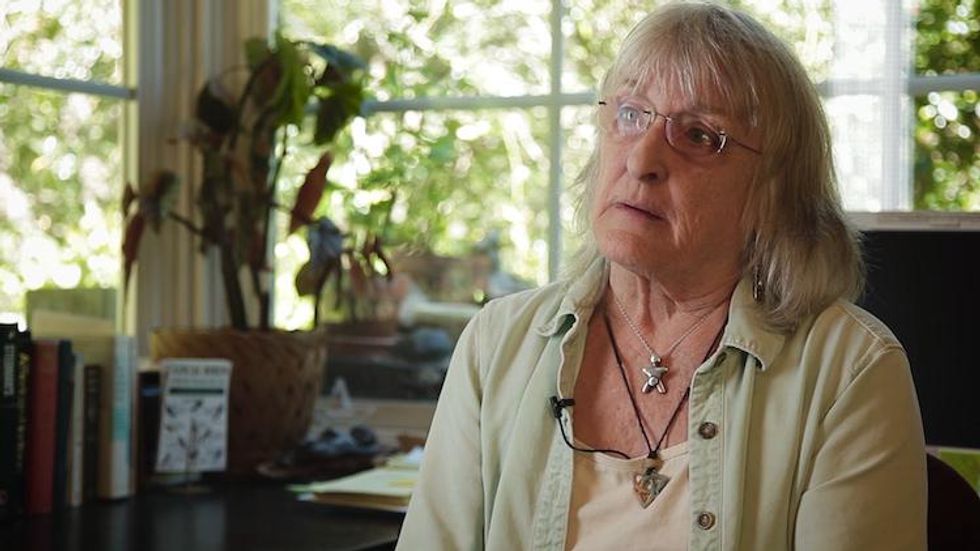Entertainment
'American Circumcision’ Director Talks HIV and Toxic Masculinity

Director Brendon Marotta questions why the surgery is routinely done on infants in the U.S. and its ramifications.
August 29 2018 7:21 AM EST
By continuing to use our site, you agree to our Privacy Policy and Terms of Use.

Director Brendon Marotta questions why the surgery is routinely done on infants in the U.S. and its ramifications.
The new documentary American Circumcision takes what may be the last, most stigmatized subject matter in America and powerfully questions the assumptions and pseudoscience that justify this practice of genital mutilation. Parts of it are difficult to watch especially where they concern “botched circumcisions” that resulted in nearly severing the child’s penis. More revealing though is the suggestion in the film that the routine surgery done on infants leads to a particular kind of PTSD that may contribute to what we refer to as “toxic masculinity” now. According to director Brendon Marotta, “Even the most pro-circumcision doctor in our film admits the pain from circumcision creates a lasting change in behavior that has been scientifically proven. Change in behavior is a form of memory, what in this case is known as somatic memory.”
Marotta continues, “When it comes to toxic masculinity or rape culture, one of our interview subjects notes that circumcision teaches men that if you are bigger and stronger than someone else, you get to do what you want to their body. It teaches this in their first shared sexual experience, the first time someone else touches their genitals, and in the relationship all other relationships will be patterned on, their relationship with their mother.”
Marotta understands that some people might have some resistance to this information and underscores his point by adding, “Imagine a friend told you when he was an infant, his parents paid someone to cut off his pinky finger without anesthesia. Would it be hard to accept this experience was formative in some way? If he told you he felt he had lasting trauma, would you believe him? Which is more personal — a finger or the penis?”
Just one example of how this manifests itself is in how circumcised men have sex.
Marilyn Milos one of the film’s subjects says, “When you alter the genitals you alter the mechanics of sex,” which Marotta says refers to the gliding mechanism of the foreskin. “In intact sex, the foreskin glides over the head of the penis, and allowing it to stimulate itself. The penis is actually meant to have moving parts that work together. When we remove these parts, the penis is stimulated through friction, rather than gliding. The man needs longer strokes to cover the same surface area. So the entire mechanics is changed.”
Milos is the founder of the National Organization of Circumcision Information Resource Centers (NOCIRC) and one of the central, compelling voices in the film. Milos, a retired registered nurse and sexual abuse survivor, sees a connection between the “arousal state that is engendered when the penis is scrubbed right before the incision is made” akin to the sexual abuse she endured as a child.

Marotta became interested in the subject during a period of his life where he was letting go of old beliefs and exploring things that had happened to him as a child. After running across this issue, Marotta had what one of his interview subjects calls, “ ‘the obsessive epiphany’ where you research everything you can about the subject. That research lead to the film, because I felt compelled to share what I was learning with others.”
“Circumcision,” Marotta says, “affects men in the most personal way possible. It affects partners of men, parents and children and yet no one has ever made a documentary about it on this scale. When circumcision is discussed in American media, it is typically viewed as a one-time decision that parents make and never have to think about again. The truth is it’s more like dropping a stone in a pond — a decision that ripples through that man’s life — through his sexuality, his body, his self-image, his relationships, his feelings, his culture, religious institutions, medical institutions, and even through the laws of his country — for the rest of his life.”

In the film, Marotta also challenges another conventionally held belief — that circumcision prevents HIV — which is widely practiced in Africa now — and interviews the authors of the HIV circumcision studies and their critics. “The authors of those studies acknowledge that the circumcised men tended to have a higher rate of condom use. So the African studies are not circumcision studies, they are condom studies. They show that condoms lower the rate of HIV transmission, which we all know.”
Marotta confesses, “Honestly though, those studies have so many methodological issues that the first edit of the sequence on the HIV studies was nearly an hour. I'll probably release that edit as a bonus feature in October. Unfortunately, most people only read the headlines, and don't get into the data. I could spend paragraphs on the data here, but I think most people instinctively know: you can be circumcised and still get HIV. The studies are not relevant to the United States, and don't address the larger questions about sexuality, and human rights.”
Multiple interview subjects in the film suggest the HIV studies are, “Scare tactics by pro-circumcision,” advocates, “Yet millions of dollars are run through these programs. $40 million from PEPFAR, more from The Bill and Melinda Gates Foundation, The Clinton Foundation... Undoubtedly, there is a story here, one that goes beyond the scope of our film.”
However he adds, “These organizations are spending millions of dollars to set up circumcision clinics in places that do not have clean drinking water. People are being trained to do the procedure, but not fix complications or botches, of which there are many even in the United States. One doctor I interviewed makes most of his living fixing circumcision botches, and even admits that you can make more money fixing the complications when it goes wrong than doing it right the first time. So it isn't just scare tactics but a selective focus. While you're looking at the HIV issue, you're not looking at the other effects of these programs: the botches, the money (that could be going elsewhere), the human rights issues, the ethical issues, the impact on sexuality...”
Marotta thoughtfully concludes, “The entire American circumcision debate suffers from this selective focus. Our goal with the film is to expand your awareness.”
American Circumcision debuts August 31st. Watch the trailer below.